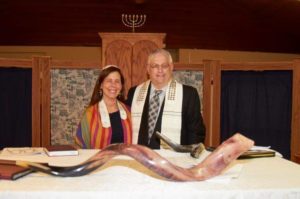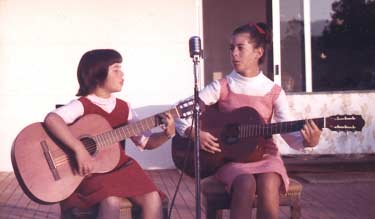About Lisa
![]()
There are some people who, inexplicably, carry with them a sense of centeredness and joy and can, just by their presence, effortlessly impart that sense to others they meet. They walk into a room and suddenly everyone, without really knowing why, feels better. Lisa Iskin is such a person.
Written by locally renowned author & writer, Jim Brumm.
With her guitar, her beaming smile, and love of life and humanity, Iskin has turned that natural gift into a life of sharing, bringing music and wisdom to others in their transitions, their rites of passage and their celebrations.
Born in Santa Monica, California, Iskin grew up immersed in music, listening as her mother and father sang around the house.
“I was always surrounded by music,” said Iskin. “If it wasn’t somebody singing, then it was records of Harry Belafonte, The Kingston Trio, and lots of others. There was always music in our house.”
But it was her father who helped her find her life’s passion.
“My dad took me to see the great musician Doc Watson,” she said, smiling. “And that was it. I knew I wanted to play the Deep River Blues. I got a guitar and practiced that song over and over for hours.”
Iskin never looked back. Music became the largest part of her life. Her first performance in front of a crowd came at age five, when she sang Tammy at summer camp. At age eight she performed with her guitar for a crowd of 250 at a luncheon with her sister Laurie. At age sixteen she got a gig at Straw Hat Pizza in Westwood Village in Los Angeles playing several nights a week.
When she turned eighteen she worked as a manager at the Great American Food and Beverage Company, a place where every employee sang or entertained in some way.
After a stint in the Trinity Mountains teaching guitar at a private school, Iskin came to Sonoma County and became a very successful solo artist in the area. She did duets with other musicians as well, formed bluegrass bands, and began to acquire a following of fans.
She was also attending Sonoma State University while performing at night.
“At one time I was going to college full time, managing a restaurant and performing,” she said, shaking her head and laughing. “I’m not as young as I used to be. I don’t know how I survived!” But the love of the music drove her.
In 1980, she was approached by a band called “California” and was hired as their bass player. “I couldn’t play bass,” she said, “but I had a bass. So I learned by the seat of my pants.”
Iskin stayed with “California” as they expanded, made a record together, and successfully toured Northern California playing fairs, rodeos, clubs, private parties and weddings. It was a heady and wonderful time. During this time Iskin became engaged to Bruce Crosby, the band’s guitarist, violinist and main songwriter. But it was not meant to be. Before they could get married, Bruce sadly passed away from leukemia.
Iskin was devastated. She quit music and began cleaning houses for a living, burying her sorrow in mindless activity and cleaning products, trying to find a way out of the darkness.
When Iskin was thirty-six, a local synagogue asked her to replace their music director, who was moving to Los Angeles. After much protesting that she didn’t know anything about the work required, she accepted.
Just as she learned the bass “by the seat of my pants,” Iskin took on this new challenge with passion and determination. She went to San Francisco to the Bureau of Jewish Education to study the things she would have to know. She needed to learn the traditions, she needed to learn the ceremonies, she needed to learn the music, and learn them she did. She held that position at two synagogues for fourteen years, and during that time she was a part of births, deaths, hospital visits, rituals, Sunday school, bar and bat mitzvahs, and other important events in peoples’ lives.
“I loved that time,” she said. “At first I didn’t feel I was meant to do it, but when I realized how much I loved it, well, I wanted to contribute my little spark to anyone I could, so they could use that spark to follow what they felt inside, what they wanted to discover; to bring them closer to their perception of God and life.
Over time Iskin’s “little spark” has become a bright, beckoning flame to many. She has co-officiated with Buddhist senseis, Catholic priests, ministers of all ilk, and has officiated on her own at many “life-cycle events.” In her words, she has become a sort of “Minister of Music,” bringing her devotion to music to bear on her devotion to the healing of the world. As Iskin tried to describe her work, her voice quavered and her eyes welled with tears.
“I want peace,” she said through the tears. “I want us all to come together, and if my music can change just one life then another may change, and the whole world may change… from separation to oneness and peace. I believe in inclusion.”
A tall order perhaps. But Iskin is placing that order nonetheless, every time she picks up her guitar and shares her music, every time she officiates over the most important date in someone’s life, every time she helps someone through a joyous celebration or a bad day. In fact, every time she leaves the house.
All who hear her remember. All who are touched by her words and her music are changed. All who come to receive the gifts of her vision, her dream, her music, her smile, leave in a state of grace.
Lisa Iskin still officiates services for everyone of all faiths, for weddings, celebrations, services of remembrance, rites of passage, and other life-cycle events.
She also performs solo or in ensemble, be it songs she has written, or favorites from many genres, for all generations.


Lisa Iskin, left, with with sister Laurie Photo by Jack Iskin